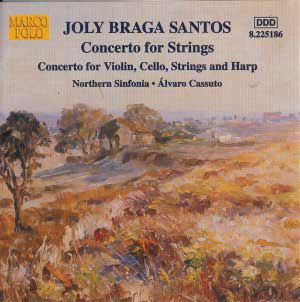It has been my pleasure to share my discoveries amongst the
music of the Portuguese composer Braga Santos. I know that I am not alone
in the high regard I have for this composer whose diatonic vigour, folk
inflections and airy directness of speech places him close to composers
such as Moeran and Vaughan Williams.
The current disc complements Marco Polo's series of
Braga Santos's symphonies - a series now stalled until they record and
release the best of the set: the part-choral Fourth Symphony.
The Concerto for Strings will present no problems
to listeners who appreciate their Vaughan Williams' Tallis Fantasia
and Dives and Lazarus, Rózsa Concerto for Strings,
Bliss Music for Strings and Howells' Concerto for Strings.
The last movement has passing resemblances to Warlock's Capriol.
The Sinfonietta is for twelve solo strings. After a typically
subdued introduction which sounds pretty avant-garde for Braga Santos
(the arch-traditionalist) comes a vigorous folk allegro with
the athletic tone of Tippett, Herrmann (Psycho) and Rózsa.
This reappears with a Bartók-like edginess in the finale. The
middle movement is heavily influenced by the Second Viennese school
with the melodic lines extruded and distorted. Four years later and
the Variations Concertantes is a set of Bergian variations in
which the section leaders and the harpist play a soloistic role amid
a bed of hyper-active and movingly intense counterpoint. The Variations
is a brief work of concert overture proportions. The variations are
not separately banded. Lastly we come to the 1968 Concerto for Violin,
Cello, Harp and Strings in which the harmony and sound-world of
the Polish avant-garde of that time is in the ascendant. Not surprisingly
this shares much with the Variations Concertantes. Surging intensity
- even anxiety - rush and ripple through this music. The Allegro
with its Stravinskian stamp is a demonstration piece - an avant-garde
scherzo - brittle and brilliant. The dazed and disquieting Berg-like
dream of the Adagio carries marks of both Penderecki and Maderna.
Astonishingly Braga Santos pulls of a miraculous transition in the final
five minutes of the adagio from Bergian anxiety into a relaxed tonal
radiance.
The Northern Sinfonia (who have also recorded Finzi
and Rawsthorne for Naxos) produce a big string sound aided by the enclosed
acoustic. Their gutsy playing under Braga Santos specialist, Cassuto
is indicative of their application to some desperately unfamiliar music.
The downside is an acoustic that is a shade claustrophobic.
Unusually challenging fare from Marco Polo. With the
exception of the Concerto for Strings this is Braga Santos from the
Fifth and Sixth symphonies end of his career. His music underwent an
astonishing transformation from the first four symphonies (which resonate
with the same language as Walton, RVW and Moeran) to the disillusion
and knowing violence of the 1960s and 1970s. Brace yourself!
Rob Barnett


